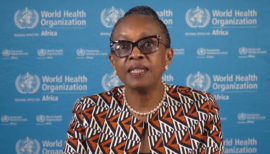
The World Health Organisation Africa Region says the mid- and long-term impact of the Russia-Ukraine conflict on vaccine and PPE supply to the continent is still unknown.
During its weekly press conference on the state of the COVID-19 pandemic in Africa, WHO Africa Director, Dr Matshidiso Moeti, said the unpredictability of the unfolding conflict makes it difficult for the organisation to predict what shortages in supplies may occur.
“For the moment, we have no information really on the impact that this military offensive will have on global vaccine supply or delivery, or the response to COVID-19 and we anticipate that as we learn more about the situation.
“We are aware that certain medical equipment, like PPE gear for health workers, remain in short supply on the continent and we hope that this will not be exacerbated if this military offensive continues or even expands,” Moeti said.
The director raised concern that beyond medical supplies, the continent also faces potential food shortages.
“We are aware, for example, that some exports from Russia to some of our countries, including food items [such as] wheat for example [are] likely to be in short supply now that flights from that country have been stopped and we… fear that this might cause prices of food to go up in some countries – exacerbating an already difficult situation for some families.
“This is a situation that we will continue to monitor, especially in terms its impact - particularly on the response to the pandemic and other suppliers that are needed for health, and we hope that it will not be significant,” she said.
WHO Africa’s coordinator for Immunisation and Vaccines Development Programme, Dr Richard Mihigo, explained that although some vaccines from Russia have been procured for the continent, the continent is not reliant on that supply.
“When we look at the vaccine supply specifically, we believe that there will be very little impact on the supply overall in the region. When we looked at the close to 700 million vaccines that have been received in the African region, when we look at the vaccine that is produced in Russia – Sputnik V – close to 3 or 3.5 million doses have been received in Africa.
“This represents less than 0.5% of the doses that have been received. But we need to look at the mid- and long-term impact of this military offensive, particularly the economic sanctions that are going along with that, and it’s very difficult to say in the long-term how this will go,” he said.
Mihigo said despite this, the COVAX facility currently supplies countries on the basis of the needs they have.
“It’s very difficult to say in the long-term how this will evolve. But again, the situation is changing every day, and the WHO and its partners are adjusting to the situation. We will be monitoring that very closely.
“The COVAX initiative has changed its supply process a bit, and [they] are now moving towards a demand-driven pipeline, where the needs of the countries have been expressed. So far, we have a very rich vaccine pipeline in the mid-term,” he said. – SAnews.gov.za


